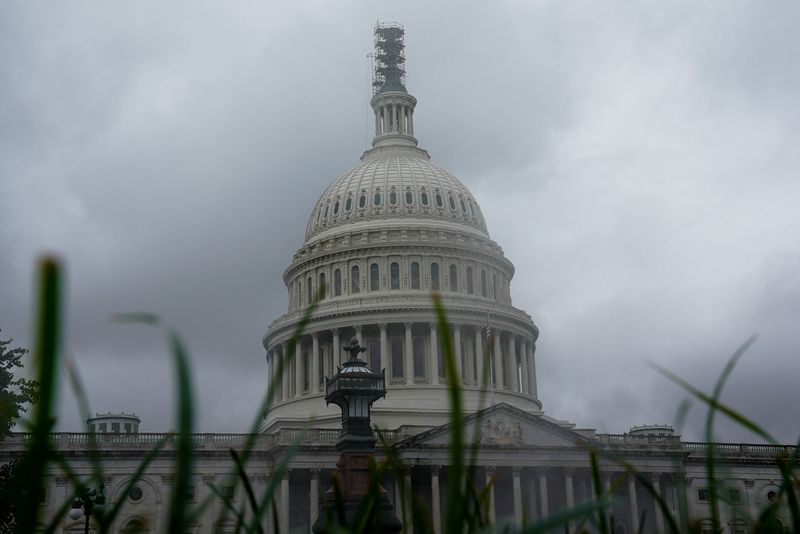US House Republicans eye stopgap funding measure to head off shutdown risk
2023.10.26 23:05

© Reuters. Rising steam partially obscures the U.S. Capitol building in Washington, U.S., September 24, 2023. REUTERS/Elizabeth Frantz
By Richard Cowan and David Morgan
WASHINGTON (Reuters) -Republicans in the U.S. House of Representatives on Thursday were debating their next move on how to avert a partial government shutdown next month, with one prominent lawmaker saying they needed to agree quickly on a “path forward.”
Newly installed Speaker Mike Johnson was floating the possibility of extending funding through mid-January or mid-April to give lawmakers more time to negotiate 12 separate bills funding the government through the fiscal year that ends Sept. 30, 2024.
But Johnson told Fox News in an interview late on Thursday that House Republicans want “certain conditions” attached to any stopgap bill. He did not give specifics but did say “I think they’ll be conditions the American people can live with and a consensus we can build around here in the House.”
Earlier in the day, multiple Republicans agreed they wanted to avert the risk of a partial government shutdown on Nov. 17, after party infighting brought the U.S. to the brink of that this month, headed off only by a bipartisan deal that led to the ouster of Johnson’s predecessor, Kevin McCarthy, which left the chamber leaderless for three weeks.
“We need a path forward,” said Representative Steve Womack, a senior Republican member of the House Appropriations Committee. He said he would like to see the House go straight into government funding negotiations with the Democratic-majority Senate as a way to expedite the appropriations process, avoiding last-minute brinkmanship.
“I would like for us to be able to avoid that by dealing with it now, rather than at the last hour,” Womack said.
Democratic President Joe Biden is also pushing for $106 billion in new spending to aid Israel and Ukraine, and beef up enforcement at the U.S.-Mexico border.
Meanwhile, the House and Senate must deal — in one fashion or another — with the 12 regular spending bills funding government activities for the fiscal year.
Fights over money have occupied most of Congress’ time for the past year. Partisan disputes brought the federal government to the brink of defaulting on its then-$31.4 trillion in debt in May, an event that would have shaken the world financial system.
Less than a month ago, intra-party fighting among Republicans brought the federal government within hours of a partial shutdown, with hardline Republicans rejecting a $1.59 trillion discretionary spending limit Biden and Johnson’s predecessor Kevin McCarthy had agreed on, instead calling for an additional $120 billion in cuts.
Notably, Johnson on Sept. 30 voted against the temporary spending bill that averted an Oct. 1 shutdown.
Representative Thomas Massie, a conservative firebrand, meanwhile told reporters that he backs a one-year extension of current spending, arguing, “There’s no real leverage in it for us to have this (government) shutdown impending.”
For months, many Republicans had opposed such a measure, arguing it simply enshrines spending priorities written last year by Democrats, who controlled the House, Senate and White House.
But under a law enacted on June 3, a year-long extension of spending would trigger across-the-board spending cuts of 1% from the last fiscal year’s appropriations. That could trouble many lawmakers who would not want to see indiscriminate cuts to social programs or the Defense Department at a time of wars in Ukraine and Israel.
The intense debates over spending come amid high interest rates that have pushed up the government’s cost of borrowing and for the federal Social Security and Medicare programs, driving Washington to a $1.7 trillion deficit for the fiscal year ended Sept. 30. It also comes amid falling tax revenues.
SENATE PROGRESS
The Senate, following long delays imposed by a few Republicans, moved ahead with three of its 12 bipartisan funding bills. By next week it hopes to pass appropriations for farm programs, transportation and housing and veterans.
Difficult negotiations by Congress over Biden’s request for aid to Ukraine and more money for border security were anticipated.
Top Senate Democrat Chuck Schumer urged the House to follow his chamber’s bipartisan model.
“In a divided government, the only way we’ll fund the government … is bipartisanship,” Schumer said. “Speaker Johnson will not be able to ignore the need for bipartisanship.”
Democratic House Minority Leader Hakeem Jeffries sounded a similar note, saying, “It’s important that my House Republican colleagues take a government shutdown off the table.”
The disagreements between Republicans that have slowed past dealmaking also remained.
“I don’t even want to think of something lasting until January or April. That would be folly in my opinion,” said Representative Andy Biggs, a prominent hardliner, voicing opposition to the stopgap funding measures known as continuing resolutions. “If you’re going to do a CR, it needs to be super short. Why? Because a CR is cruise-control.”








